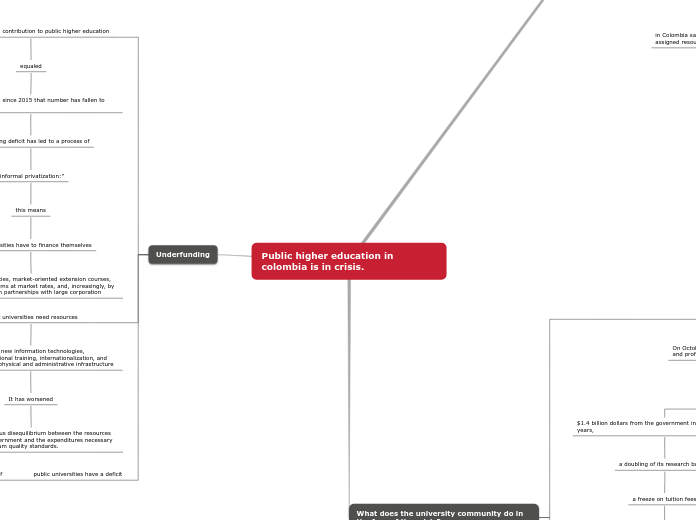przez valentina Galindo 5 lat temu
237
Public higher education in colombia is in crisis.

przez valentina Galindo 5 lat temu
237

Więcej takich
It has worsened
the already precarious disequilibrium between the resources provided by the government and the expenditures necessary to guarantee minimum quality standards.
0.55 percent of GDP, since 2015 that number has fallen to 0.40 percent
The growing deficit has led to a process of
“informal privatization:”
this means
that universities have to finance themselves
by selling consultancies, market-oriented extension courses, and graduate programs at market rates, and, increasingly, by establishing research partnerships with large corporation
During those days Alejandro Palacio, quoted in the epigraph, a spokesperson for the student movemen
along
with the country’s progressive trade union federation (CUT), which has called for nationwide marches
students are demanding
to re-open negotiations with the government, specifically with President Duque himself,
to
ensure the current semester will not be canceled, and to secure guarantees for the exercise of civil rights.
$1.4 billion dollars from the government in the course of ten years,
a doubling of its research budget
a freeze on tuition fees
the refinancing of student loans at a zero percent interest rate
preservation of funding for vocational and technical schools
respect for the right to protest and voluntary rather than mandatory accreditation
free
BUT
Articles 67-69
which state that the role of the Colombian state is to help individuals and families by regulating markets between public and private universities
private institutions are systematically favored
accreditation
based on
criteria for “academic excellence”, in order to create a fiction of a meritocracy in one of Latin America’s most unequal societies in the world’s most unequal region.
privatized
through
Imported from U.S. universities and pervasive in Colombian private universities
The job of the state, in this vision
is
to provide
property rights
subsidizing the entry of the poor intro competitive markets to determine quality as well as the ability to pay tuition and fees.
security
credit
international financial institutions
neoliberalism
Under the so-called “educational revolution”
aunched by President Álvaro Uribe in the early 2000s,
the business sector
the government’s National Training Service (SENA), together with sub-standard, for-profit universities, would provide vocational training programs for the impoverished labor force in order to increase the competitiveness
Colombia’s elite private universities
who would supply the existing demand for the professional education of the country’s middle class through subsidized credits
by extending loans and credits provided by the Colombian Institute of Education Credit and the Exterior (ICETEX).
public universities
in Colombia saw a tripling of student quotas, while their assigned resources were adjusted only by inflation.
neo-classical economics
disfavoring
the public universities
to close, while others began to cut back on student residences and university cafeterias and to hire more and more adjunct professors, who, like their counterparts elsewhere, make up the majority of total faculty and work under precarious conditions
favoring
the expansion of mining, hydrocarbons, agri-business, urban real estate, and financial services in the Global South, and the development of technology and intellectual property rights at universities in the North, subsidized by governments and linked to multinational corporations.
neo-institutionalism
As part of the neoliberal restructuring of Colombia´s economy and state institutions
The government of President César Gaviria froze the budget assigned to public universities
forcing them
to seek external resources to function.
commodified
what the students done to halt it
high-quality